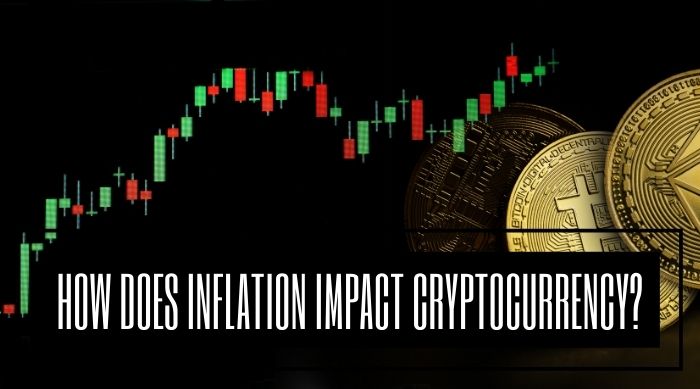How does inflation affect cryptocurrency? It’s a question that’s on the minds of many who look at both traditional investment opportunities (stocks, bonds, commodities) as well as newer, riskier options (cryptocurrency, NFTs).
In an age where inflation is a serious problem that dominates morning financial headlines, some look to Bitcoin and other cryptocurrencies as a hedge against inflation, but is that a safe or even realistic option? Opinions vary, but some of the most respected cryptocurrency sites online tend to agree that the common denominator is the age of crypto as a factor.
Inflation And Cryptocurrency

If you are a newcomer to investing or crypto, you may not understand the full implications of investing money in Bitcoin or Ethereum during a time of economic uncertainty, or inflation.
The reasons people invest in commodities and riskier options like Bitcoin have a lot to do with the rewards for taking that risk when those rewards are forthcoming. The old adage, “nothing ventured, nothing gained” does apply to high-risk investments.
When economic times get tough in traditional markets, you’ll find trends that have some more experienced investors fleeing risky ventures like commodities and into safe-haven investments like Treasury bills.
But diverse portfolios are the name of the game and you may learn some savvy investors don’t fully divest themselves of the risky investments–they just move the money around to keep it safer in uncertain times.
That’s the traditional world. For some, the thinking might be, “If the U.S. Dollar is losing value, I should invest in something that has rising value and that could potentially beat inflation.” Not bad thinking, except when it comes to cryptocurrency. But why?
How Does Inflation Impact Cryptocurrency?
One thing that is different about the current inflation problem is that economic growth does not (at press time) seem to have slowed as a result of the dollar buying less.
That means that some traditional investing behavior may not apply or may apply differently than it has in the past. But one thing is clear–if you want to protect your investment capital, you want to put that money in something with more stability than you have now.
And the crypto market is not a place to find that stability, unfortunately. But don’t take our word for it. An article published by Quartz in January of 2022 notes that the crypto market has fallen “precipitously from its all-time high”, noting that since November 2021 there was a selloff that “halved its global market value from $3 trillion to $1.5 trillion as of Jan. 24”.
What does that mean in concrete terms? That the crypto market does not have the same relative stability that the U.S. dollar does, even with inflation factored in. And the causes of that instability are not always specifically tied with the investment itself, but external factors like Elon Musk’s ability to seriously influence the price of Bitcoin with a single Twitter post.
Elon Musk can’t really do the same thing with the U.S. Dollar. And that should be a warning sign to anyone who is looking to Bitcoin, Ethereum, or any other cryptocurrency to act as a hedge against inflation.
Is Bitcoin A Hedge Against Inflation?
A glance at the articles published in the crypto community by people who tend to understand these issues and write intelligently about them reveals a common thread. Bitcoin and any other cryptocurrency available at press time can’t be taken seriously as a hedge against inflation for one single very important reason.
It just hasn’t been tested. Cryptocurrency simply isn’t old enough to prove itself in hard economic times. We don’t know what a digital currency that has no real-world backing by a commodity or asset can do if economic conditions continue to decline.
An untested safety net or parachute remains a liability until it is proven to work as advertised. Would you volunteer to be a test subject for a new kind of parachute without knowing even a bit more about the previous attempts?
So what we have is a lot of talk, and a lot of investor enthusiasm, but ultimately no history to review to see what might happen next time.
Does that sound familiar? It’s the basis of every confidence swindle in the book, and while cryptocurrency as a whole may not qualify as a scam, pyramid scheme, or confidence trick, it pays to remember one very important thing. If all you have are promises and hope, and there’s no data or long-tail information to inform your choices, you are making decisions based on FOMO and emotional investing.
Many writers in the crypto space say the same thing. Don’t trust crypto to bail you out where inflation is concerned. It’s too new, it hasn’t really been stress-tested in our current economy, and there are no indicators that crypto can “save” you and beat a devalued dollar.
Since crypto is subject to sharp changes in value depending on hype, planned scarcity, and other issues, it by nature lacks the stability to be used as a hedge against any financial uncertainty. Don’t over-invest in crypto during inflation. Stay diverse and keep your options fluid. Adopting more risk-averse investment strategies may not be terribly exciting, but it does protect your investment capital.
Joe Wallace has covered real estate and financial topics, including crypto and NFTs since 1995. His work has appeared on Veteran.com, The Pentagon Channel, ABC and many print and online publications. Joe is a 13-year veteran of the United States Air Force and a former reporter for Air Force Television News.


